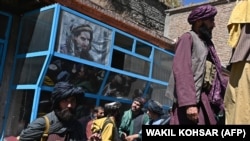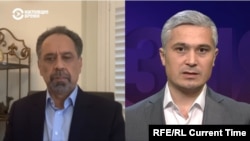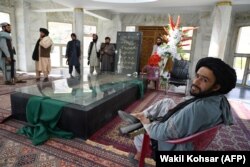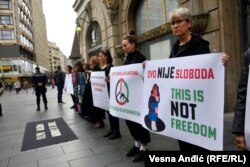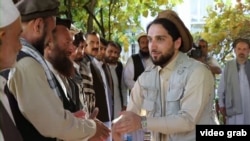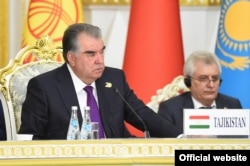Over a month since the Taliban’s August 15, 2021 seizure of power in Kabul, the extremist Islamist group is competing with the anti-Taliban National Resistance Front, based in Afghanistan’s northern Panjshir region, for international audiences’ attention and support.
Without international economic and humanitarian aid, the Taliban will be scrambling for ways to address the widespread displacement of civilians throughout the country and a drought, war-driven food shortage that could lead to a “winter of economic collapse,” warned Sergei Danilov, deputy director of the Russian Academy of Sciences’ Center for Middle East Studies.
Afghanistan’s Taliban-led government on September 21 petitioned the United Nations, the world’s largest provider of emergency assistance, to recognize Suhail Shaheen, their spokesman in Doha, Qatar, as Kabul’s new envoy to the UN. The Taliban foreign minister, Amir Khan Muttaqi, has asked to address the General Assembly, but, as of September 22, without success.
Roughly a week earlier, members of the European Parliament called for the legislative body and the European Council, to invite 32-year-old Ahmad Massud, the head of the National Resistance Front, to address both bodies about the crisis in Afghanistan.
Ahmad Masud’s whereabouts are unknown since the Taliban moved into Panjshir.
A September 21 report by The Intercept that the younger Masud has gone into hiding in Tajikistan has not yet been confirmed.
Already, over the past month, Massud’s uncle, Ahmad Wali Masud, a former Afghan ambassador to the United Kingdom, has been encouraging foreign media audiences, from India to Turkey, to view the Taliban as an untrustworthy group linked to “global terrorism.”
The Islamist group announced on September 6 that it had seized complete control of the Masuds’ native Panjshir region, but the elder Masud, brother to the legendary slain Panjshir resistance fighter Ahmad Shah Masud, disputes that assertion.
Rather, Ahmad Wali Masud claims that the National Resistance Front’s “partisan struggle” against the Taliban will spread throughout northern Afghanistan, the stronghold of opposition to the Taliban in the 1990s, and the Soviet Army in the 1980s.
He spoke from London with Current Time Asia anchor Akram Abdukakhor on September 20, 2021.
-Mr. Masud, where is the leader of the National Resistance Front now? Why has there been no news from Ahmad Masud? Is he alive?
- In the name of God. Yes, he is alive and well. His location is being kept secret. In the near future, an appeal from him will be published.
-Before the seizure of Panjshir, there were many forecasts that the Taliban will not be able to take the region. What was the reason for the fall of Panjshir?
-The Taliban gathered their forces from all 33 provinces. They dragged out of there fighters from all the terrorist groups located there, and built up an enormous quantity of various types of arms. Finally, after 10 days, they could break the line of defense.
But they couldn’t take Panjshir completely. There’s resistance going on there to this day. A large part of the region is under our control.
-Not long ago, the Taliban announced that they had seized enormous warehouses of arms, fuel, and provisions belonging to the National Resistance Front. Considering that the Panjshir is surrounded, how long can the resistance continue?
-The National Resistance Front did not have large supplies. For precisely this reason, the resistance couldn’t withstand direct confrontations with the Taliban for a long time.
The second issue is that the war now has taken on a partisan character. It’s important to note that, for 40 years, a partisan war has been waged in the Panjshir against invaders.
Now, after some preparation, the resistance has activated the partisan war, and I want to underline that this kind of struggle will be widespread beyond the borders of Panjshir. It will cover all the northern provinces of Afghanistan.
After a month, the people are coming to understand that the Taliban don’t have any ideals at all and are not capable of solving the population’s problems. For that reason, everything is going downhill.
-And why didn’t resistance in other regions start immediately after the Taliban’s arrival?
-Because everyone was hoping on President [Ashraf] Ghani’s 300,000-person army. People thought that the government army will be able to resist [the Taliban]. No one even imagined that the army would crumble so quickly. Therefore, there wasn’t preparation for resistance there.
Now, aside from Afghanistan itself, an anti-Taliban campaign is going on outside the country, in many countries of the world. People are going out to demonstrations, there’re ongoing political consultations.
-You handle the National Resistance Front’s political issues. Are there any contacts with the former leaders of the first resistance front [against the Taliban in the 1990s] – with [former First Vice President General Abdul Rashid] Dustum, [former Second Vice President Karim] Khalili, [People’s Islamic Unity Party of Afghanistan leader Mohammad] Mukhaqiq, [former Balkh Province Governor Atta Mohammad] Noor, and others?
-Yes, they all have direct ties with the leader of the National Resistance Front (Ahmad Masud – ed.). And, God willing, the resistance will soon become universal, with the participation of all of Afghanistan’s ethnic groups.
Everyone has assured themselves that the Taliban, apart from their seizure of power by force, do not have any staffing capacity besides a bunch of terrorist groups.
They’re not capable of running the country. In the time that they’ve been in power, they couldn’t even satisfy society’s primary demands. Aside from the display of force and aggression, they were unable to prove themselves.
-I want to ask about the National Resistance Front’s failed negotiations with the Taliban. Is it true that you demanded 25 percent of the seats in Afghanistan’s new government from the Taliban, as some Taliban leaders assert?
-That’s completely wrong. During the negotiations, the National Resistance Front never put forward conditions similar to that. We were always talking about the future form of government for the country. The National Front urged the Taliban to adopt a structure that would be representative and could reflect the interests of the people of Afghanistan.
We were talking about the values that should guide the future government: elections, democracy, women’s rights, civil rights, human freedom, and freedom of speech.
The National Front never raised the question about dividing up posts [in the government]. Unfortunately, in order to legitimize their emirate, the Taliban want a pair of posts to go, through a concession, to representatives of other forces. But we do not agree in principle with such an approach.
-In the last few days, there has been much talk about possible Taliban negotiations with representatives of Afghanistan’s other non-Pashtun ethnic groups. Recently, the leaders of Pakistan and Tajikistan discussed such an option. What do you think, will Pakistan be able to compel the Taliban to create an inclusive government?
-Up until now, Pakistan’s leadership has not been able to fulfill the promises it made earlier. They couldn’t do anything. Earlier they were saying that they will force the Taliban to create an inclusive government, but they couldn’t get this to happen.
Now, they’re again making promises. They’re making promises to Tajikistan’s leadership. I think that we’ll see pretty soon what will be the result.
-Judging by the appeals of Ahmad Masud in western publications and your efforts in Europe, the National Resistance Front is looking for support in the West. Why are similar such efforts not made toward countries that supported the first resistance in the 1990s [against the Taliban]; in particular, Iran, India, and Russia?
-The region’s countries consider that they’ll be able to hold talks with the Taliban to their own advantage. But in the near future, they’ll understand that talks with the Taliban do not answer their interests. On the contrary. They will sense that it was to their detriment because the Taliban are part of global terrorism, and they will not be able to separate themselves from them.
Terrorist groups do not know any kind of limits and borders. At the first possibility, they will attempt to penetrate the country’s regions.
In the countries of the West, other values prevail. Public opinion in the West is against the idea of the Taliban.




